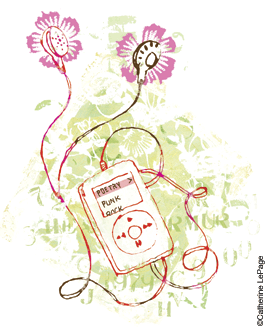
Picture this: The kid in front of you in the checkout line is seriously grooving, engrossed in whatever sounds are coming from the milk-white earbuds sprouting from his head.In his hand is an iPod, one of those ubiquitous portable music players that everybody under the age of 25 seems to have, and he’s still fiddling with it when you finally tap him on the shoulder to indicate that he’s up at the counter.
“Sorry,” he says, flashing a smile and sliding the earphones off, “I couldn’t hear you over the Robert Creeley I had playing.”
Wait … the whatyou had playing?
That’s the vision that Penn English professors Al Filreis and Charles Bernstein have for their newest project, PennSound. Launched on New Year’s Day, PennSound is a unique, web-based poetry archive that offers free—and legal—downloads of poetry sound recordings. Best of all, the audio files are offered as bite-size mp3s, easily downloadable and transferrable to CDs, desktop media players, and portable music players like the uber-popular iPod.
“What we’re doing is a really revolutionary thing,” says Al Filreis, the Kelly Professor of English, PennSound co-director, and director of Penn’s Center for Programs in Contemporary Writing (CPCW), which sponsors the project. By making poetry available in single-poem files, and setting up a downloading system that parallels the music downloading craze, “we’re seizing on a popular technology and a technological habit that a lot of people who don’t normally associate with poetry are involved in.” And, Filreis adds, the response has been enormous: “People write in to say, ‘I was afraid of poetry in school,’ or ‘I wouldn’t know what to do with a book of poems if I bought one’—but surfing the web is what people do naturally, and PennSound gives poetry an availability and mobility it never had before.”
In the past, most poetry recordings available online were of full 30-minute or one-hour readings—far too large to easily download. The single, song-length mp3 files that PennSound offers usually take around three to eight minutes to transfer from the internet to a computer. In addition, bibliographic information is embedded in each file, so that a user receives not only the sound file but also important facts such as the poet’s name, the name of the piece, and the date and location the recording was taken. “It’s as much about preservation as distribution,” Bernstein comments.
PennSound’s services are also free. Currently the site offers a fast-growing selection of over 1,500 files, from single poems recorded at Kelly Writers’ House readings over the past 10 years, to new material like the Studio 111 discussion series, in which a class of Penn students conducts interviews with visiting poets. In each case, the poet or estate was contacted for permission before the files were posted. Getting permission for free use hasn’t been a problem, because “there’s no real commercial value in poetry recordings,” Bernstein explained. “There’s no sense that someone would otherwise be able to market this material in a way that would produce income, unlike in the music industry.” On the contrary, PennSound has had poets contact the project to ask to be included, since “the poets feel that they’ll make money by disseminating this stuff freely, so that people will become interested and buy the print copy.”
Another of PennSound’s innovative facets is its upcoming cataloging tool. The Annenberg Rare Book and Manuscript Library, in collaboration with the Schoenberg Center for Electronic Text and Image (SCETI), is currently working with PennSound to create a sophisticated online audio cataloging tool, the first of its kind. Once the catalog is in place early next year, users will be able to search by any relevant keyword—bibliographic data, event description, or even recording personnel—and stream the file (which lets users play the file without downloading it first) directly from the catalog site.
Funding for PennSound currently comes from Penn’s Center for Programs in Contemporary Writing and private donors, but Filreis stresses that—as with all other aspects of the project—involvement hasn’t been limited to “poetry people” but rather to all those who “want new technology to be used in unanticipated ways” and who want it to “inspire creativity.” And that, he adds, is the main goal of PennSound: to “take poetry out of the classroom and put it into ordinary, everyday life. Like your kitchen, or your car.”
Or the iPod of that kid in the checkout line in front of you.
—Alison Stoltzfus C’05




